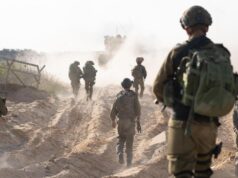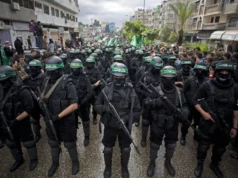In a major victory against al-Qaeda on Tuesday, Pakistani forces took control over a 156-cave network inside the small village of Damadola that, until recently, was the Taliban and al-Qaeda’s “nerve center”. “It was the main hub of militancy where al-Qaeda operatives had moved freely,” including Ayman al-Zawahiri, second in command to Osama bin Laden, said Pakistani regional commander Major-General Tariq Khan. The caves, carved into mountains and hidden from sight, housed military supplies including: stockpiles of guns and ammunition, bazookas, artillery shells, rocket propelled grenades, mines and stolen U.S. army uniforms. According to Gen. Khan, militants from Egypt, Uzbekistan, Chechnya, and Afghanistan worked inside the caves.
Capturing Damadola, a district in the Bajaur tribal region near the Pakistan-Afghanistan border, is a major success for the Pakistani army. In fact, this is the second time Pakistan has launched an operation inside the Bajaur region. The army first mounted an offensive there in August 2008 and claimed victory in February 2009, but violence returned when the army switched it’s focus to Pakistani Taliban fighters in Swat and South Waziristan. However, following the Pakistani army’s victory this week, local tribesmen formed militias to defend their villages, vowing to support the army in fighting the militants. “We will not let the Taliban to return to our villages,” said Sultan Khan, a local farmer.
Pakistan hopes that the operation will help the U.S.-led troops in their fight against insurgents across the border in Afghanistan. However, while the taking of Damadola is certainly a victory for the U.S. in the war against jihadist forces, it is too soon to determine if the results will be long lasting. As Daveed Gartenstein-Ross notes in the fall 2008 issue of inFOCUS, “al-Qaeda’s supporters enjoy a strong presence in Pakistan’s military and intelligence services,” and, to date, Pakistan’s military has failed to effectively police the entire country.





